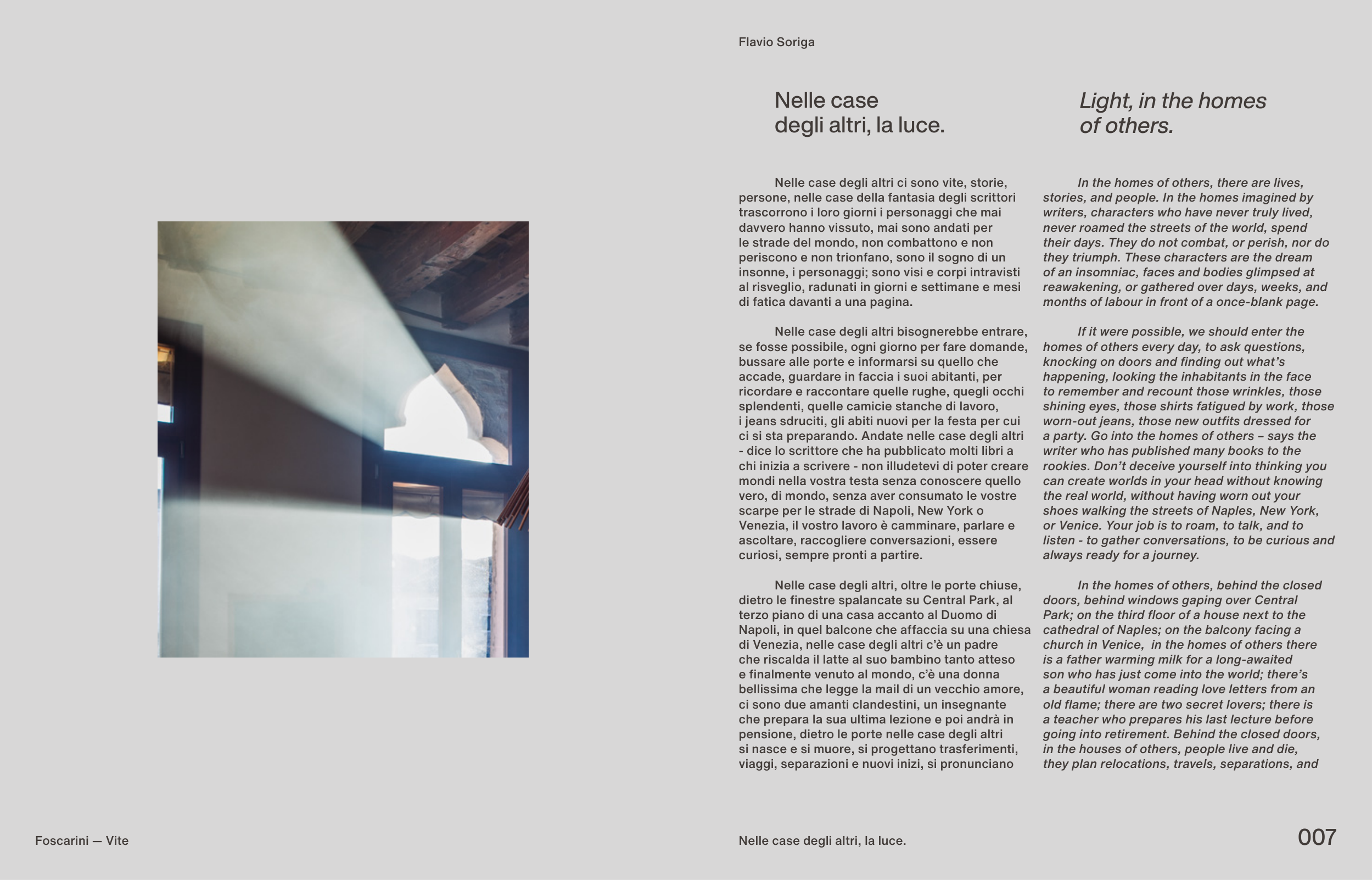Nelle case degli altri ci sono vite, storie,
persone, nelle case della fantasia degli scrittori
trascorrono i loro giorni i personaggi che mai
davvero hanno vissuto, mai sono andati per
le strade del mondo, non combattono e non
periscono e non trionfano, sono il sogno di un
insonne, i personaggi; sono visi e corpi intravisti
al risveglio, radunati in giorni e settimane e mesi
di fatica davanti a una pagina.
Nelle case degli altri bisognerebbe entrare,
se fosse possibile, ogni giorno per fare domande,
bussare alle porte e informarsi su quello che
accade, guardare in faccia i suoi abitanti, per
ricordare e raccontare quelle rughe, quegli occhi
splendenti, quelle camicie stanche di lavoro,
i jeans sdruciti, gli abiti nuovi per la festa per cui
ci si sta preparando. Andate nelle case degli altri
- dice lo scrittore che ha pubblicato molti libri a
chi inizia a scrivere - non illudetevi di poter creare
mondi nella vostra testa senza conoscere quello
vero, di mondo, senza aver consumato le vostre
scarpe per le strade di Napoli, New York o
Venezia, il vostro lavoro è camminare, parlare e
ascoltare, raccogliere conversazioni, essere
curiosi, sempre pronti a partire.
Nelle case degli altri, oltre le porte chiuse,
dietro le finestre spalancate su Central Park, al
terzo piano di una casa accanto al Duomo di
Napoli, in quel balcone che affaccia su una chiesa
di Venezia, nelle case degli altri c’è un padre
che riscalda il latte al suo bambino tanto atteso
e finalmente venuto al mondo, c’è una donna
bellissima che legge la mail di un vecchio amore,
ci sono due amanti clandestini, un insegnante
che prepara la sua ultima lezione e poi andrà in
pensione, dietro le porte nelle case degli altri
si nasce e si muore, si progettano trasferimenti,
viaggi, separazioni e nuovi inizi, si pronunciano
In the homes of others, there are lives,
stories, and people. In the homes imagined by
writers, characters who have never truly lived,
never roamed the streets of the world, spend
their days. They do not combat, or perish, nor do
they triumph. These characters are the dream
of an insomniac, faces and bodies glimpsed at
reawakening, or gathered over days, weeks, and
months of labour in front of a once-blank page.
If it were possible, we should enter the
homes of others every day, to ask questions,
knocking on doors and finding out what’s
happening, looking the inhabitants in the face
to remember and recount those wrinkles, those
shining eyes, those shirts fatigued by work, those
worn-out jeans, those new outfits dressed for
a party. Go into the homes of others – says the
writer who has published many books to the
rookies. Don’t deceive yourself into thinking you
can create worlds in your head without knowing
the real world, without having worn out your
shoes walking the streets of Naples, New York,
or Venice. Your job is to roam, to talk, and to
listen - to gather conversations, to be curious and
always ready for a journey.
In the homes of others, behind the closed
doors, behind windows gaping over Central
Park; on the third floor of a house next to the
cathedral of Naples; on the balcony facing a
church in Venice, in the homes of others there
is a father warming milk for a long-awaited
son who has just come into the world; there’s
a beautiful woman reading love letters from an
old flame; there are two secret lovers; there is
a teacher who prepares his last lecture before
going into retirement. Behind the closed doors,
in the houses of others, people live and die,
they plan relocations, travels, separations, and
Nelle case
degli altri, la luce.
Light, in the homes
of others.
Foscarini — Vite
Flavio Soriga
Nelle case degli altri, la luce.
007




